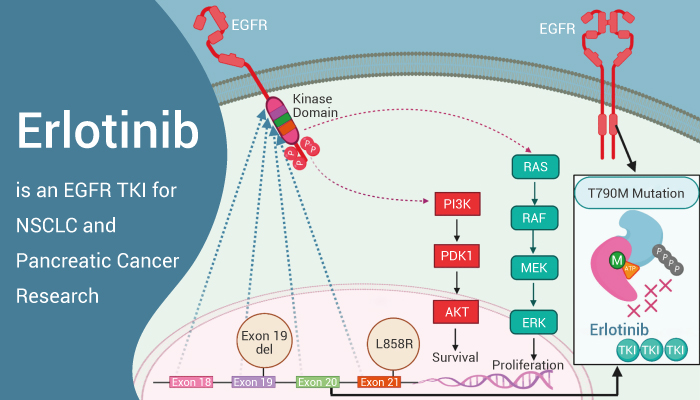The epidermal growth factor receptor (EGFR) is a transmembrane protein that is a receptor for members of the epidermal growth factor family (EGF family) of extracellular protein ligands. The EGFR family of receptor tyrosine kinases (RTK) comprises four distinct receptors: the EGFR (also known as ErbB-1/HER1), ErbB-2 (neu, HER2), ErbB-3 (HER3) and ErbB-4 (HER4). Besides, the ErbB family of RTKs couples binding of extracellular growth factor ligands to intracellular signaling pathways regulating diverse biologic responses, including proliferation, differentiation, cell motility, and survival. Furthermore, deficient signaling of the EGFR and other receptor tyrosine kinases in humans is associated with diseases such as Alzheimer’s, while over-expression is associated with the development of a wide variety of tumors. Interruption of EGFR signaling, either by blocking EGFR binding sites on the extracellular domain of the receptor or by inhibiting intracellular tyrosine kinase activity, can prevent the growth of EGFR-expressing tumors.

Erlotinib (also known as CP-358774, NSC 718781 or OSI-774) is a selective, orally active and directly acting EGFR tyrosine kinase inhibitor.
In addition, Erlotinib reduces EGFR autophosphorylation in intact tumor cells. Erlotinib has the potential for non-small cell lung cancer (NSCLC) and pancreatic cancer research. Mechanically, Erlotinib inhibits binding of ATP to the intracellular tyrosine kinase domain of EGFR, thereby inhibiting receptor intracellular phosphorylation and blocking downstream signal transduction. Erlotinib inhibits EGFR that blocks tumor cell division, produces cell cycle arrest, and initiates programmed cell death in EGFR-overexpressing human tumor cells. For example, Erlotinib inhibits the proliferation of DiFi human colon tumor cells and blocks cell cycle progression at the G1 phase. Moreover, at doses of 100 mg/kg, Erlotinib completely prevents EGF-induced autophosphorylation of EGFR in human HN5 tumors growing as xenografts in athymic mice and of the hepatic EGFR of the treated mice.
In summary, Erlotinib is a selective and orally active EGFR inhibitor with potent anticancer activities.
References:
[1] J D Moyer, et al. Cancer Res. 1997 Nov 1;57(21):4838-48.
[2] Ahmed A Abdelgalil, et al. Profiles Drug Subst Excip Relat Methodol. 2020:45:93-117.